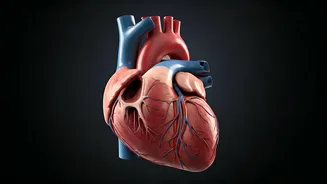NSAIDs: Painkiller Risks
Nonsteroidal anti-inflammatory drugs (NSAIDs) are a familiar category of medications often used to alleviate pain and reduce inflammation. These drugs,
found in numerous over-the-counter pain relievers, can pose risks to the heart. When used over extended periods or in high doses, NSAIDs have been associated with an increased risk of heart failure, high blood pressure, and potentially, heart attacks. The impact on heart health is multifaceted, involving vasoconstriction (narrowing of blood vessels) and fluid retention, both of which can strain the cardiovascular system. Patients with pre-existing heart conditions, or those at risk, are especially vulnerable, making it crucial to use NSAIDs cautiously. Always consult with a healthcare professional to assess risks and determine appropriate usage. The cumulative effect of long-term use should be carefully evaluated, as even seemingly harmless drugs can have hidden cardiac consequences.
Decongestants: Hidden Heart Effects
Decongestants are frequently used to relieve nasal congestion caused by colds and allergies, but they can come with hidden cardiac costs. These medications typically work by constricting blood vessels, which reduces swelling in the nasal passages, providing temporary relief. However, this vasoconstriction can also increase blood pressure and place additional stress on the heart. Individuals with hypertension, or those prone to cardiovascular issues, should exercise extreme caution when using decongestants, as they may trigger dangerous elevations in blood pressure or exacerbate existing heart conditions. The stimulants often present in decongestants further add to the potential cardiac risk. Consulting a doctor before use, especially if you have a history of heart problems, can help mitigate these risks. Seeking alternatives or managing symptoms naturally may also be considered to avoid cardiac side effects.
Stimulants: More Than Focus
Stimulants are often used to enhance focus and energy levels. While these medications can boost alertness, they can also trigger a cascade of cardiac effects. Stimulants elevate heart rate and blood pressure, potentially increasing the risk of cardiac arrhythmias, or irregular heartbeats. For individuals with undiagnosed heart conditions, stimulants may pose a significant danger, as they can accelerate the progression of heart disease. Even in those with no apparent heart issues, prolonged use of stimulants could lead to increased strain on the heart, leading to long-term issues. Careful monitoring and evaluation of individual risk factors are essential before commencing stimulant use. Consider lifestyle modifications, such as regular exercise and a balanced diet, as alternative strategies to improve focus and energy levels.
Chemotherapy Drugs: Cardiotoxicity Risk
Chemotherapy drugs, essential in the treatment of various cancers, can sadly have adverse effects on the heart. Certain chemotherapy agents are cardiotoxic, meaning they can directly damage heart muscle, leading to conditions like cardiomyopathy, where the heart becomes weak and inefficient. The severity of the cardiotoxicity can vary significantly, depending on the specific drug, dosage, and duration of treatment. Patients undergoing chemotherapy should be closely monitored for cardiac symptoms. Early detection is critical, since intervention can sometimes limit damage. Cardioprotective strategies and supportive care can help mitigate some of the side effects, but patients should always discuss the potential heart risks with their oncologist. Cardiac health is frequently overlooked during cancer treatment, but it is equally important to safeguard the patient's well-being and long-term prognosis.
Common Medications: Watch Out
Beyond the specific drug categories discussed, some commonly prescribed medications can also impact heart health. Always thoroughly review the potential cardiac side effects when prescribed any new medication. Even drugs used for seemingly unrelated conditions, such as diabetes or mental health disorders, can affect the heart. Maintaining regular follow-up with a healthcare provider is essential, in order to address any concerns. Being informed about medications and their potential risks can enable individuals to make better healthcare decisions and take proactive steps toward maintaining a healthy heart. Always consult your doctor if you have any doubts about medications you are currently taking.














